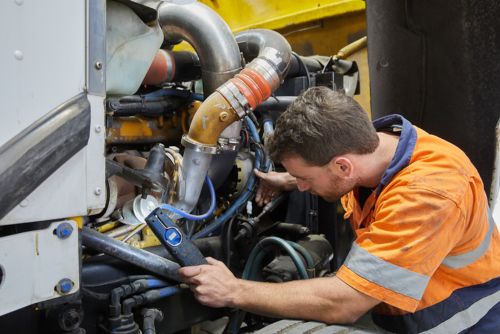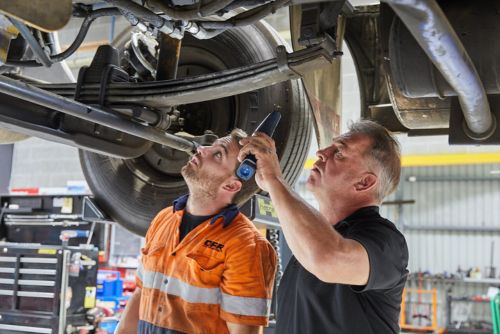
As we cruise down the long and winding road of truck engine longevity, it’s like embarking on a journey with an old friend who surprises you with their resilience. You might be wondering, just how far can that trusty engine take us before calling it quits?
Well, buckle up because the answer might not be as straightforward as you think.
Factors such as maintenance practices, driving conditions, and engine type all play a role in determining how many kilometers can a truck engine do before it stops working with the help of a reliable truck mechanic.
Our truck engine’s lifespan depends on maintenance, driving habits, and fuel quality. Engine durability depends on regular maintenance. Checkups and maintenance can extend the life of our diesel engine. Maintenance neglect reduces engine performance and increases the risk of unexpected breakdowns. The type of truck engine brand and manufacturer also plays an important role in its durability. Keeping a detailed service history lets us monitor the engine’s health and fix any issues quickly, extending its lifespan.
The type and quality of fuel we use also affect truck engine longevity. High-quality diesel improves engine performance and reduces wear, extending its lifespan. Poor fuel can clog filters, reduce efficiency, and adds up to the cost of replacements and repairs. Using clean, high-quality fuel helps keep the engine running well.
In addition to maintenance and fuel quality, driving habits affect truck engine longevity. Stress from aggressive driving, sudden accelerations, and abrupt stops can shorten engine and component life. Smooth acceleration, gentle braking, and following speed limits reduce engine stress, extending its lifespan.

Understanding diesel engine mileage measures how efficiently a truck engine uses fuel over a distance. A diesel engine’s mileage depends on several factors:
Understanding these factors allows truck owners and operators to make informed diesel engine mileage and performance decisions. For powerful and durable vehicle engines, diesel engines are a viable choice.
Truck engines need regular maintenance by a professional mechanic to perform well and last a long time. By regularly maintaining their engines, truck owners can extend engine life and cover more kilometers without major issues. Change oil, replace filters, check fluid levels, and inspect belts and hoses for wear and tear. The engine needs these maintenance checks to run smoothly.
Maintenance neglect diminishes engine durability and performance. Unmaintained engines can build up debris, lose lubrication, and experience increased friction, which can cause premature wear and breakdowns. Neglect can significantly shorten the engine’s lifespan.
Maintenance and professional mechanical work also prolongs engine life and improves road safety. It is not recommended to perform a do-it-yourself mechanical work. Well-maintained engines are less likely to break down unexpectedly, reducing accidents and costs. Regular maintenance is a proactive approach that improves engine longevity, performance, and peace of mind.

Truck engines need regular maintenance to last and perform well. Neglecting maintenance by a mechanic in Victoria may lead to the appearance of engine wear. This factor is important when you want to know how many kilometers can a truck engine do before it stops working. Here are a few indications of engine wear in your truck:
Checking for signs of wear and tear and fixing them promptly can extend the life of your truck engine and prevent costly breakdowns.
Truck engines need regular monitoring and repairs to last. Regular engine oil checks ensure it’s at the right level and free of harmful contaminants. Checking the engine for leaks, noises, and vibrations can help identify problems early. Tuning the engine and cleaning the air filters can extend engine longevity and maximize fuel efficiency.
Maintaining the truck engine requires following the manufacturer’s schedule. It is also required to change oil and oil filters at the recommended intervals, as well as check and replace coolant and transmission fluid. Inattention to routine maintenance can prematurely wear out the engine.
Driving habits can also affect the lifespan of a truck engine. Avoiding excessive idling, overloading, and aggressive driving can reduce engine stress. Truck owners can extend engine life and reduce breakdowns.

Tracking a truck engine’s mileage can reveal its average kilometers before major repairs. Knowing a truck engine’s average lifespan and how long it will last before major issues arise can significantly reduce repairs.
Here are four key points to consider:
In conclusion, maintaining a truck engine is crucial for maximizing its lifespan.
By understanding the factors that affect engine longevity, regularly servicing the engine, and being mindful of signs of wear and tear, truck owners can ensure their engines run smoothly for as long as possible.
With proper care and attention, a truck engine can cover many kilometers before major repairs are needed. So now you know how many kilometers can a truck engine do before it stops working.
Premium fuel may extend truck engine life. The higher octane levels can improve engine performance and efficiency. This may reduce engine component wear and tear, extending their lifespan.
Driving in extreme heat or cold can shorten a truck engine’s lifespan. Heat can cause engine parts to overheat and wear, while cold can make starting the engine difficult and reduce efficiency.
Regular maintenance and manufacturer recommendations can help to reduce these effects and optimize performance in all weather conditions.
Absolutely!
Aftermarket parts and modifications can extend a truck engine’s life. Upgrades include synthetic oils, high-quality air filters, and efficient cooling systems. These upgrades can boost engine performance, reduce wear, and extend its lifespan.
Engine durability depends on regular maintenance and manufacturer recommendations.
Truck longevity depends on engine oil quality. It lubricates moving parts, reduces friction, and prevents overheating.
Regular oil changes, according to manufacturer recommendations, optimize engine performance. Old or low-quality oil can cause engine damage over time.
Thus, high-quality engine oil is necessary for engine efficiency.
Long periods of idling can reduce the lifespan of truck engines. Idling can cause incomplete fuel combustion, engine component wear, and engine efficiency loss.
Minimizing idling helps our trucks’ engines last longer and perform better.